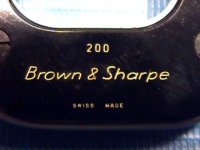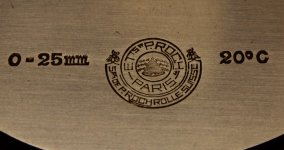Both Mormons and Masons use the beehive to symbolize a group of individuals working together for the common good. This perhaps hints that M. Pierre Roch was a member of one, or perhaps both, of those groups.
Note also that the French word meaning "stallion" is "etalon".
Beyond that, there is a posting on ebay of a P Roche vernier caliper etched with the circular beehive logo surrounded by text "Etts P Roch Paris", and, in a ribbon underneath the logo, "Succrs P Roch a Rolle" above a second line "Exiger la ruche, marque deposee." My French is not good enough to definitively translate, but I think that "Establishment P Roch, Paris", "Successors to P Roch at Rolle", and "Require the hive, registered trademark" are reasonable interpretations.
https://www.ebay.com/itm/392272183058
And finally, since this same question was asked on both the Metrology and Antique Machinery and History forums, I'm going to cross-post my anecdotal reply from the Metrology forum:
"I've seen "P Roch" branding on French-made micrometers, dial calipers, and precision levels that were purchased new in the mid 1980s. I don't remember if the second line on the markings was "France" or "Paris", and can't rule out seeing both.
Several years later, I was chatting with one of the French mechanics at the European Space Agency launch base in French Guiana about plumbing the spin axis of a rotary table -- commonly, if incorrectly, called "leveling" the table. In accordance with launch-base rules, he had to do the actual adjustment, while I, being responsible for the spacecraft measurements, had to measure the residual plumbing error.
We chose different weapons. He used a P Roch precision level of 4 arcsecond per 2 millimeter division; I used a Federal electronic level.
We compared total-tilt results, which differed by 1 arcsecond. I must have sounded like I was either astonished or especially happy with the agreement of our measurements, because he began to brag about the level he used.
During the course of our conversation, he told me that the P Roch levels were no longer sold under that name, but under the EDA name, and that they were manufactured in a small town north of Paris."







